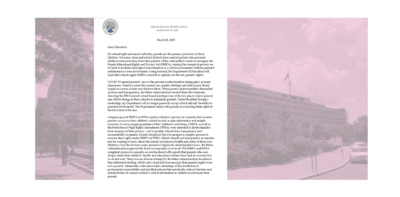
This roundup on the impact of the federal government on education includes updates on early child care and Secretary McMahon’s remarks on July 4th
Frozen funding
On Monday, June 30, the U.S. Department of Education (Department) sent the following to the N.C. Department of Public Instruction (DPI) regarding federal funding that was expected to be disbursed on July 1.
Given the change in Administrations, the Department is reviewing the FY 2025 funding for the [Title I-C, II-A, III-A, IV-A, IV-B] grant program(s), and decisions have not yet been made concerning submissions and awards for this upcoming academic year. Accordingly, the Department will not be issuing Grant Award Notifications obligating funds for these programs on July 1 prior to completing that review. The Department remains committed to ensuring taxpayer resources are spent in accordance with the President’s priorities and the Department’s statutory responsibilities.”
Three sentences with a big impact.
Here are the sources of the funding with estimates reported by Education Week, based on data from the department:
Title I, Part C: Migrant Education | In NC: $5,356,426
Title II, Part A: Teacher and School Leader Supports | In NC: $67,906,396
Title III, Part A: English Learners | In NC: $19,338,744
Title IV, Part A: Student Support and Academic Enrichment | In NC: $37,245,499
Title IV, Part B: 21st Century Before and After-School Programs | In NC: $35,719,614
Adult Basic and Literacy Education | In NC: $18,636,144
Adult Integrated English Literacy and Civics Education | In NC: $1,671,946
According to Education Week, an estimated total of $185,874,769 in federal funding for North Carolina is frozen.
Across North Carolina, those that rely on federal funding to provide programs to students across the state are stressed.
ourBRIDGE for KIDS in Charlotte, for example, issued a statement, saying:
We were counting on $826K to support our two afterschool programs, which welcome 230 children each day. That’s 31% of the funding we had planned for the upcoming school year.
Not receiving this funding would mean a major interruption to the stability and routine of 180+ families that are counting on us not just for high-quality afterschool programming where kids are happy, but also for full, healthy meals, emotional support, academic help, transportation, etc.
Hyde County Schools says the freeze impacts more than $350,000 of expected federal support for the school system, including approximately $300,000 in afterschool programming and $50,000 in Title funding that provides for Multilingual Learner (MLL) services, professional development for educators, and tuition reimbursement, according to a press release.
“Afterschool programs serve as a critical lifeline for families providing enrichment, academic support, and a safe environment beyond the traditional school day. The paused Title funds also jeopardize crucial services for students learning English and limit continued learning opportunities for staff, all of which are central to the district’s mission of educational excellence,” says the release.
Hyde County Schools is calling on parents, families, alumni, business leaders, and civic partners to reach out to local, state, and national lawmakers. “Community members can help ensure the voices of rural school districts are heard,” says the district.
Superintendent Melanie Shaver added, “If you or your child have benefited from afterschool programs, MLL services, or if you’ve seen the impact of well-prepared educators in your schools, we urge you to share your stories. Advocacy is not just about policy — it’s about real people, real classrooms, and the future of our children.”
On July 6, DPI said any carryover funds from 2023-24 and 2024-25 could be used to fund these programs, but “since Public School Units cannot apply for or receive funds that have not yet been awarded to the state,” planning allotments were temporarily withdrawn.
On July 10, 150 U.S. House Democrats sent this letter calling for Secretary Linda McMahon to “follow the law and release the funding meant for our schools, teachers, and families.”
The expensive and expansive budget reconciliation bill
The 870-page-long federal budget reconciliation bill cuts taxes. It also cuts through the federal safety net that many in North Carolina and across the nation rely on. It also includes a federal voucher program.
Here is a list, published by The New York Times, of almost all of the provisions in the bill and how much they cost or save. Despite significant cuts, the Congressional Budget Office estimates the bill would increase the deficit by $3.4 trillion from 2025-2034.
Leaders of both parties are concerned about the impact of the bill.
After a meeting of the N.C. Council of State on Tuesday, July 8, Gov. Josh Stein said, “the federal government is just dumping expenses onto the state.” From Medicaid to SNAP, more state funding will be needed to maintain access to health insurance and food.
According to reporting by the News & Observer, Stein also said, “the state has to be exceptionally conservative fiscally, meaning that we have to preserve the revenue sources we have to so that we can deal with issues like feeding hungry children, or ensuring that our health care system works for everybody, that there are doctors in rural counties.”
COVID funding
At the end of March, a “Dear Colleague” letter was sent from Secretary of Education Linda McMahon to state chiefs of education. The letter ended the spending of COVID funds effective the same day, even if the state had received a waiver.
At the time, McMahon said in the letter, “Any reliance on a discretionary extension subject to reconsideration by the agency was unreasonable.”


A lawsuit was filed, and a federal court issued a preliminary injunction.
“On May 6 and June 3, 2025 the United States District Court for the Southern District of New York entered a preliminary injunction in New York et al. v. Department of Education et al., 1:25-cv-02990-ER, enjoining the Department from ‘enforcing or implementing as against Plaintiffs’ the Secretary’s March 28 revocation of the extension period and the creation of the project-specific liquidation extensions for 16 plaintiff states and the District of Columbia,” says the department’s website.
On June 26, the department informed all state chiefs by letter that it would honor the original late liquidation deadlines approved by the Biden Administration “during the pendency of this litigation,” as long as “broadly, expenditures are intended to ‘prepare, prevent, and respond to coronavirus.'”
Here is more information.
In other news
Child care discussed on the Hill
On June 24, the House Education and Workforce Subcommittee on Early Childhood, Elementary, and Secondary Education held a hearing titled, “Child Care and the American Workforce: Removing Barriers to Economic Growth.” In his opening remarks, Subcommittee Chair Kevin Kiley (R-CA) said, “One analysis of 2024 costs found the national average price of care to be $13,128. I think most parents would agree this is simply unsustainable.” The First Five Years Fund said the hearing highlights “overwhelming bipartisan agreement that child care is key to a robust economy.” You can watch the hearing, and here is a summary.
Nomination of Penny Schwinn advances
On June 26, the U.S. Senate Health, Education, Labor, and Pensions (HELP) Committee voted to advance the nomination of Penny Schwinn to serve as Deputy Secretary of Education for the U.S. Department of Education.
U.S. Senator Bill Cassidy, the chair of the committee, said, “If confirmed as Deputy Secretary of Education, Dr. Schwinn will play an integral role in reforming a Department that has lost its purpose. Its bureaucracy and red tape have stood in the way of student success. Dr. Schwinn has a strong record of improving education systems, including as Tennessee Commissioner of Education and Chief Deputy Commissioner of Education in Texas. This experience will be vital as the Trump administration looks to return power over education to states and ensure all students have the opportunity to succeed.”
You can watch the hearing here.
The U.S. Department of Education provides guidance on expanding school choice and turning around schools in need of support
On June 26, the department’s Office of Elementary and Secondary Education sent a letter to all chief state school officers providing guidance on how states can use their federal formula funds under the Elementary and Secondary Education Act of 1965 (ESEA) to both expand education choice and turn around failing schools, according to this press release.
“This guidance focuses on schools identified for support and improvement due to low performance, including comprehensive support and improvement (CSI), targeted support and improvement due to consistently underperforming subgroups (TSI), and additional targeted support and improvement (ATSI),” says the press release. Here is the “Dear Colleague” letter.
The White House and AI in education
On June 30, the White House announced more than 60 organizations are on board with the White House’s pledge to encourage investments that support how artificial intelligence will be used in education.
According to the press release, the organizations “pledge to make available resources for youth and teachers through funding and grants, educational materials and curricula, technology and tools, teacher professional development programs, workforce development resources, and/or technical expertise and mentorship” over the next four years, working alongside the White House Task Force on Artificial Intelligence Education.
Together, the press release says, “the pledge will help make AI education accessible to K-12 students across the country, sparking curiosity in the technology and preparing the next-generation for an AI-enabled economy.”
On April 23, President Donald Trump issued this executive order, titled “Advancing Artificial Intelligence for American Youth.”
U.S. Supreme Court affirms parental right to opt out of public school lessons for religious reasons
On June 27, in a 6-3 decision, the U.S Supreme Court found in Mahmoud v. Taylor that a public school district’s introduction of “LGBTQ+-inclusive” storybooks, combined with a no-opt-out policy, “places an unconstitutional burden on the parents’ rights to the free exercise of their religion.”
Ahead of July 4th, Secretary Linda McMahon published remarks on “patriotic education”
Leading with a reference to a 1789 letter from Thomas Jefferson to the president of Harvard University, McMahon writes about liberty and love, stating “(t)rue love for this country has become rarer today, and in fact, radical hatred has become more common.”
You can see all of EdNC’s reporting “From DC to NC” here.
Recommended reading



